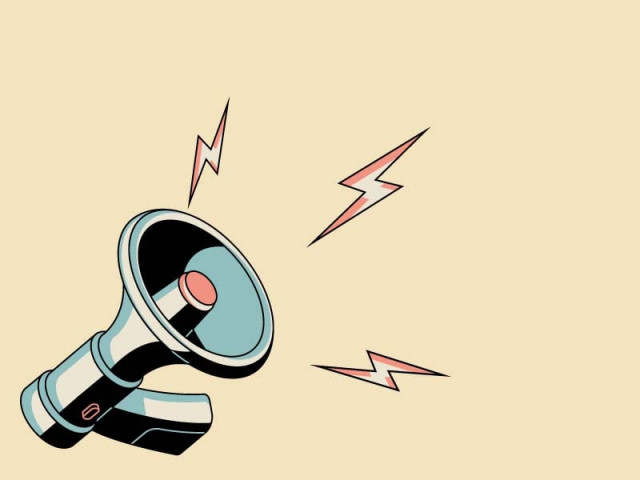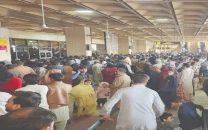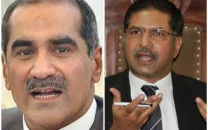The students march today: here’s why
Six students, mobilising in Sindh, explain why they are taking to the streets

DESIGN BY: MOHSIN ALAM
Dekhnā hai zor kitnā bāzū-e-qātil meñ hai
On a chilly Wednesday evening in Karachi, on the rooftop of a house in Gulshan-e-Iqbal, sit a group of students with dishevelled hair, tired bodies and fiery eyes. In front of them lie crumpled pieces of paper, rough pamphlets bearing careful creases of having been folded and unfolded several times, as the ones making the pamphlets rework them to get them just right. Pencils and pens are strewn about on a mattress spread on the floor. A tamborine, a bongo, and a darbuka stand against the wall - the students are engaged in last minute organising, prepping for the Students Solidarity March to be held today (Friday).
Sarfaroshī kī tamannā ab...
It is to the rhythm of this verse that the students are marching. Shouted passionately by a girl in a leather jacket, this chant went viral on social media earlier this month, but students, across the nation, have been prepping for the march since long before.
“It’s not like we haven’t done this before. The march was held last year as well. This year, it’s gaining more traction because even when conventional media doesn’t give coverage, social media does,” says Fidda Kakar, a student of geology who is currently pursuing his MBA from the Federal Urdu University of Science and Technology.
Students demanding basic facilities thrashed by police
Who is marching and why?
“There are around 15 to 16 student organisations in Karachi, and from across Sindh. From across Pakistan, there are nearly 20,” says Kakar. “They represent students from numerous public and private universities and are organising in several cities of the country. We are all rallying under the banner of the Students Action Committee.”
As to why the march, Kakar says that previously, students mobilised either in an individual capacity or in small pockets. “Individual and fragmented movements could not hold momentum for too long. The purpose of this march is to give students a collective platform, a united voice. As a collective, the momentum is stronger, our voices are louder”.
Citing similar reasons, Rehman Khalid, 23, a final year criminology student at the Karachi University, and Ghazi Malla, 24, a second year student at the Shaheed Zulfiqar Ali Bhutto University of Law, say that while each city may highlight the concerns specific to their region, the primary demands remain the same.
The where and the what?
In Karachi, the march is set to begin at 3pm at Regal Chowk, from where the students will march towards the Karachi Press Club. In Hyderabad, from Sindh University Old Campus to Press Club; in Khairpur, they will gather at Shah Abdul Latif University; in Larkana, from Tank Chowk to Press Club; in Jamshoro, the rally will join the march in Hyderabad; in Ghotki, the students will march from Press Club to Pippal Chowk, and in Moro, from Bypass Town to Press Club. Other areas of Sindh where the students are organising include Naushero Feroze, Tando Jam, Nawabshah and Thari Mirwah.
Circulating on social media are six central demands - the provision of merit-based, quality education in all institutions, an end to racial, religious, and gender-based profiling of students, withdrawal of the recent fee hikes and restoration of the HEC’s budget, constitution of legal committees for sexual harassment cases with students’ representation, uniform curfew timings irrespective of gender, and the lifting of the ban on student unions as per Sindh Assembly’s resolution and for the rest of the country to follow suit. On Facebook and Twitter, besides other platforms, there are pictures of a longer list of demands that demand the provision of basic facilities in hostels, all national languages to be made compulsory at the primary level and for 5% of the country’s GDP to be allocated for education, among others.
Elaborating further, Malla says, “We are marching because politics is our right. It’s not just our Constitutional right, it is also our democratic right”.
“We want our voices to reach the parliament because we [the students] are the nurseries from where leaders emerge,” he adds. “We want student unions because the absence of unions creates a vacuum which is then filled by the elite class, by capitalist and feudal interests”.
Jay Kumar, a recent graduate of Sindh University (SU), refers to the state-mandated syllabus which he feels is often divisive. “Minorities are filled with fear now as they are excluded from the narrative. Earlier they would take ownership of Sindh and the country. They felt heard. The Constitution guarantees us equal rights but it is not always implemented on the ground.”
Why does anyone care?
“We are not being allowed to develop a political consciousness. We are not even allowed to know about our rights, let alone be equipped with the tools to peacefully demand our rights,” said Sana*, a third year student at The Indus Valley School of Arts and Architecture. In private universities, she says, the administrations are more concerned with making money as opposed to providing facilities to students.
Referring to SU, Kumar said that earlier, student organisations were actually student wings of political parties which voiced the concerns of the broader politics off-campus.
“We are asking for basic facilities on campuses and the right to hold our respective administrations accountable. This is what is bringing even the apolitical student within the ambits of the movement as basic facilities are also their concerns,” adds Kumar.
Referring to the recent protests at SU, he said, “We took water from 49 coolers on campus and got it tested at a chemical laboratory in Jamshoro. It was arsenic water that can cause typhoid, diarrhea, and constipation, among other illnesses,” he says.
Student councils, unions, organisations
There is a clear difference between a student union and a student organisation, say Malla and Khalid.
“A student union is selected through an election process. All student organisations participate in the elections and each individual has the right to cast their vote. The elected members then have a say in the university’s administration,” explains Khalid.
The lack of elections is what excludes current student groups on campuses from student unions, he adds. “Certain right wing groups are allowed to operate on campuses. They represent their own interests, not the issues of students on campus. Violent student elements would also be compelled to modify their approach if student unions exist as they will then have to stand in elections. No individual would cast their vote for violent groups.”
Students continue protest against varsity harassment
Private universities have student councils, however, the nature of these bodies is such that they cannot hold the administration accountable in the way students could in the 1960s and 70s, adds Sana.
On what grounds?
“Article 16 (freedom of assembly) and Article 17 (freedom of association) of 1973 grants us the legal and constitutional rights of assembling peacefully and also the right to form unions and associations in this country,” says Hamza Tariq, 26, a law student at the Denning Law School.
When asked about whether the student leaders have been in contact with the authorities and whether they will be provided any security for the march, Kakar says, “Security is not something we are given, we are threatened instead. However, we are used to this and remain undeterred”.
*name changed to protect identity
Published in The Express Tribune, November 29th, 2019.



















COMMENTS
Comments are moderated and generally will be posted if they are on-topic and not abusive.
For more information, please see our Comments FAQ